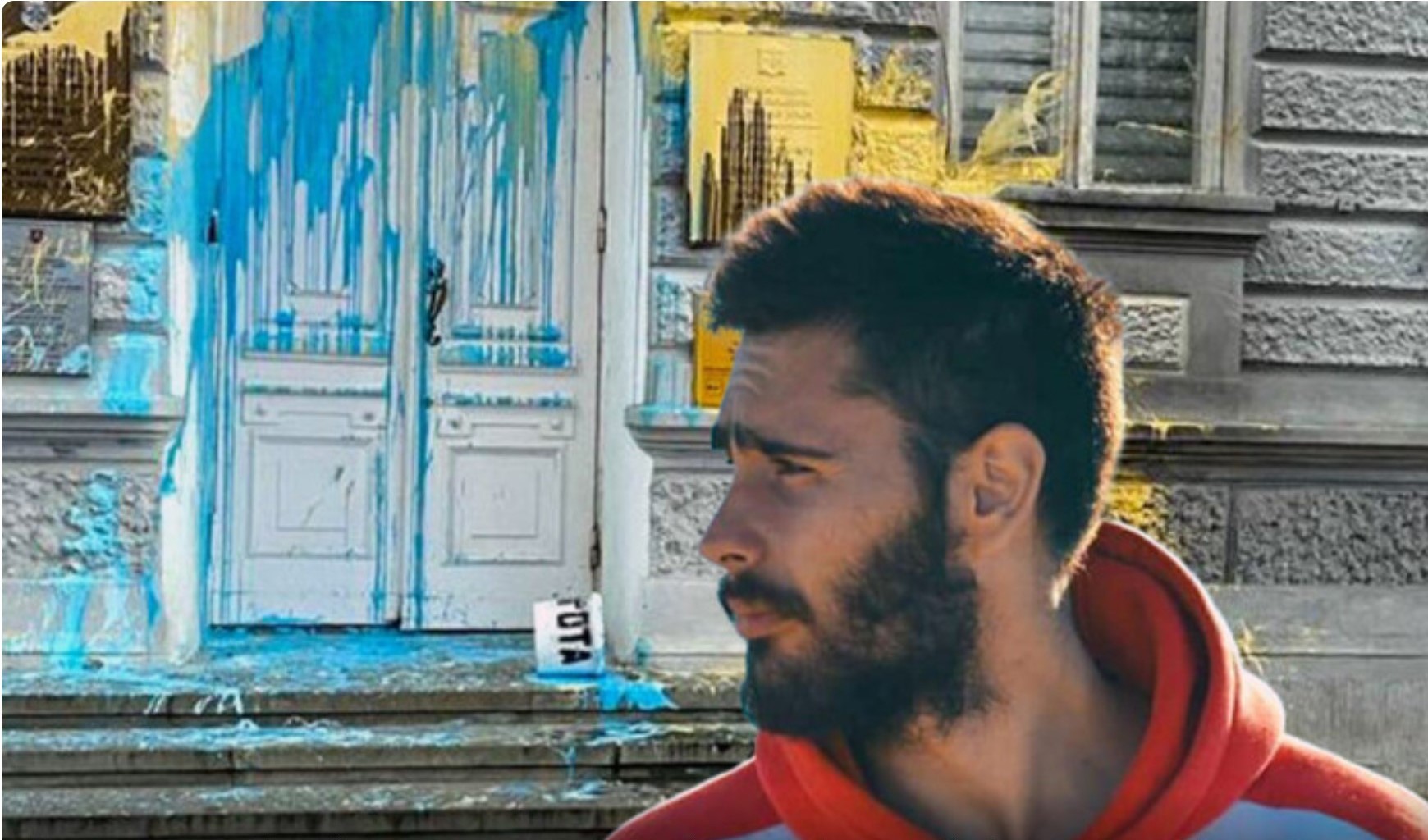Crimean artist Bohdan Ziza's 15-year ‘terrorism’ sentence for opposing Russia’s war against Ukraine

Bohdan Ziza will be turning 29 on 23 November, his second birthday in Russian captivity since the Crimean artist and political activist was arrested for a protest against Russia’s full-scale invasion of Ukraine. Russia’s revenge was swift and brutal with Bohdan seized, tortured and then charged with preposterous ‘terrorism’ charges and sentenced to 15 years’ harsh-regime imprisonment. Following the rejection of his appeal on 27 September, the sentence has now come into force.
‘Symbol of pro-Ukrainian protest in occupied Crimea’
This was how Bohdan Ziza was recently described by Olha Skrypnyk, Director of the Crimean Human Rights Group. She called the charges against Ziza politically motivated and stressed that he had been arrested for an act of protest aimed solely at drawing attention to Russia’s war against Ukraine and the crimes it was committing. Despite the pressure and evident physical duress that Ziza he had been subjected to, he had remained firm in insisting that this had been an act of protest, and in no way ‘terrorism’. Even according to Russian legislation, Ziza’s actions on 15 May 2022 in hurling paint, in the yellow and blue colours of the Ukrainian flag, at the entrance of the occupation administration building in Yevpatoria, constituted vandalism, no more. This is, Skrypnyk, stresses “a classic example of an activist facing political persecution for his clear stand.”’ Nor is this the only indicator of a politically motivated arrest and prosecution. Ziza had been held incommunicado with his lawyer constantly being misinformed as to where he was being held in order to prevent him from receiving proper legal defence. During this period, physical duress was applied to force him into ‘confessing’ to supposed acts of terrorism.
Despite this, Bohdan Ziza used his final address (excerpts here) at the notorious Southern District Military Court in Rostov (Russia) to deny the charges, state that he remains true to Ukraine and to read out, not only lines of a Ukrainian poem, but also a list of Ukrainian political prisoners. “That is, understanding that he would be convicted, he continued his struggle not only for himself but for Ukrainian political prisoners, and the 15-year sentence is a direct reaction to his struggle. I am convinced that, had he behaved differently, the sentence would have been more lenient. I think that the fact that they foisted the terrorism charges was in reprisal for his refusal to break and knuckle under.”
Russia’s full-scale invasion, its crimes in Bucha and Mariupol, were the final straw
Ziza (or Azizov on his passport) was still in his teens when Russia invaded and annexed Crimea. He had lived there with his grandmother, and, since his mother’s death when he was just 22, his only remaining relatives are in mainland Ukraine.
According to his sister, Oleksandra Barkova, Bohdan had always held a clear pro-Ukrainian position, with this becoming even more pronounced after the full-scale invasion on 24 February 2022. They had communicated almost every day, and she says that her brother had been particularly upset over the events in Bucha and Mariupol. She says that he had written that he could not remain silent and believes that all of this became the final straw and prompted his protest.
Protest and Russia’s response
In the early hours on 16 May 2022, Ziza hurled blue and yellow paint at the entrance to the occupation Yevpatoria administration building. He also had a Molotov cocktail with him, however, he has insisted that this was merely to give more impact to the video clip that he was making of the protest, and certainly not to set the building alight. He has consistently denied that this had anything to do with ‘terrorism’. Nor, indeed, do Russia’s enforcement bodies normally view such acts as more than vandalism, except when they involve Ukrainians in occupied Crimea and protests against Russia’s war of aggression.
Ziza was seized immediately and has been imprisoned ever since. Once he was finally able to speak with an independent lawyer, and during his ‘trial’, he confirmed that the supposed ‘confession’ that Russian propaganda channels showed almost immediately had been extracted through torture (and had been one of at least five that he was forced into making while held incommunicado).
Ziza was initially fined under one of the administrative charges hastily introduced (together with criminal charges) to silence protest over the full-scale invasion. He was not, however, released from SIZO and it became known in late November 2022 that ‘terrorism’ charges had been concocted. The indictment included four articles of Russia’s criminal code: Article 205 § 1 (carrying out a terrorist act); the same article but as the threat to carry out a terrorist act; 205.2 § calls to terrorism and 214 § 2 (politically motivated vandalism). He was also placed on Russia’s so-called ‘List of extremists and terrorists’.
‘Trial’ and sentence
Ziza was moved to a Russian SIZO in January 2023 where the ‘trial’ took place before the same Southern District Military Court in Rostov that has been passing politically motivated sentences against Crimean Tatar and other Ukrainian political prisoners since soon after Russia’s invasion of Crimea.
Both presiding ‘judge’ Roman Plisko and the prosecutor, Vladislav Kuznetsov have personally taken part in numerous other political trials. On 5 June 2023, Kuznetsov demanded an 18-year sentence, with the panel of ‘judges’ under Plisko on 6 June convicting Bohdan Ziza of all four charges and handing down a 15-year sentence in a harsh-regime prison colony.
This sentence was, predictably, upheld on 27 September 2023 by ‘judge’ Maksym Panin from the Military court of appeal in Vlasikha (Moscow region). The latter institution has been equally complicit in rubber-stamping gravely flawed convictions of Ukrainian political prisoners.
Bohdan’s address for writing letters will be posted here as soon as it is known.
Please help by publicising information about Bohdan Ziza and Russia’s persecution of him for a courageous act of protest over its criminal aggression against Ukraine.





